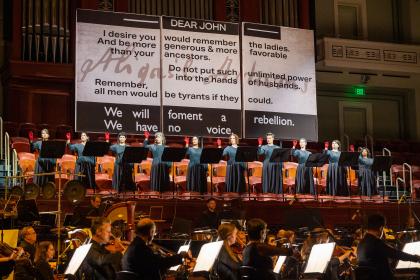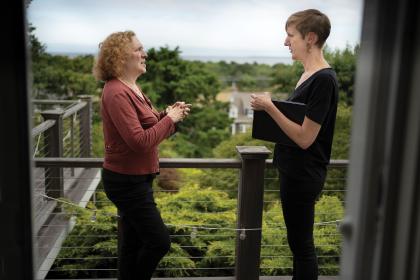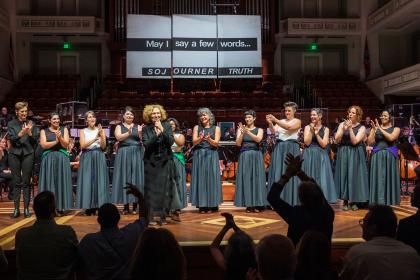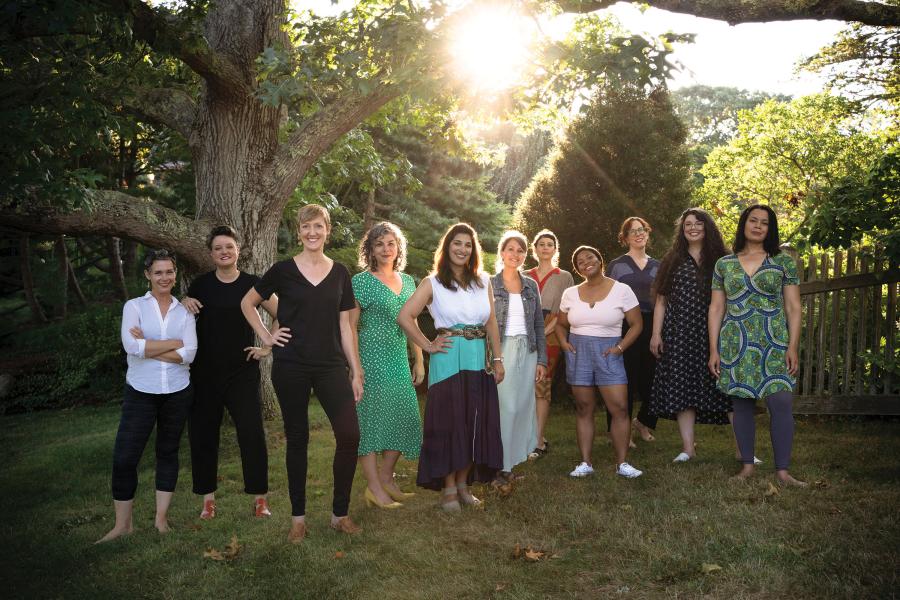The rangy cedar-shingled house is perched on a bluff above Falmouth, Massachusetts, on what you might call Cape Cod's shoulder. That gray-green smudge on the horizon—barely visible out in the shimmering Atlantic and midsummer haze—is famed vacation isle Martha's Vineyard.
As diverting as this view is, the scene on the other side of this large room commands attention: 10 women standing on a small stage before music stands. "We have no voice!" they sing while an accompanist runs sternly undulating arpeggios on a nearby Steinway grand.
We have no voice!
No voice!
No voice!
The tone is urgent. The voices intertwined so as to be purposefully discordant like a polyphonic train horn—and employed here for the same reasons: calling out an alarm, a warning, a threat.
Weeeeee haaaavve nooooo vooooice!
It becomes a plaintive, drawn-out wail.
A couple of ironies are at play here. Certainly, they do have voices as these are among the most talented and trained sopranos and altos in the country. Professionals all, their résumés present a thicket of operatic and symphonic performances amid a range of other musical works—Bach to Björk, madrigals to Handel's Messiah.
They soon change it up again, placing their right hands over their mouths to emit only a gasp. "We have no … (gasp)!"

Image credit: Kurt Heinecke/Nashville Symphony
Women singing about being silenced? You'd be correct in assuming it's political, but in another irony, it's not a response to current events, such as the Supreme Court decision eliminating the constitutional right to an abortion. The voicelessness here dates a wee bit further back—to the spring of 1776 and a letter Abigail Adams wrote to her husband, John Adams, as he and other members of the Continental Congress prepared for American independence. She urged him to "remember the ladies" and warned that "we will not hold ourselves bound by any laws in which we have no voice." The 10 women here will sing much of Adams' missive, including the devastating line delivered in a whisper: "Remember, all men would be tyrants if they could."
The words are Adams', but the voices are those of the Lorelei Ensemble, a celebrated 15-year-old women's vocal group founded by Peabody Institute Associate Professor and Director of Choral Studies Beth Willer. She's the 11th woman on the stage, standing before the others and using every bit of her lithe, nearly 6-foot frame to convey musical direction—undulating her arms in delicate arcs or whipping them in forceful jags as the sonic demands dictate.
A final woman in the room to introduce is composer Julia Wolfe, carefully listening to the proceedings from a nearby chair. Her low-key comportment belies a formidable status. She's the recipient of the Pulitzer Prize for Music in 2015 for her oratorio Anthracite Fields, about the travails of a Pennsylvania coal region. Once again, Wolfe has looked backward for modern music inspiration. Her Story is a 35-minute work for Lorelei and orchestra based on American women's ongoing struggle for equal rights and representation. It features the words of not only Adams but also abolitionist Sojourner Truth, along with snippets of slogans, slurs, and comics from the suffragist era.
"OK, let's take a break there," Willer says and heads back to convene with Wolfe while the vocalists file out to enjoy downtime at the capacious property that includes a pool, bocce court, and Asian-inspired sunken garden. The home is owned by an arts patron who provides Lorelei free access to the property for rehearsal.

Image caption: Julia Wolfe and Beth Willer talk outside Her Story rehearsal in Falmouth, Massachusetts.
Image credit: Jodi Hilton
And there's still a lot of rehearsing to do. Her Story was jointly commissioned by five prominent symphonies: Nashville, Chicago, Boston, San Francisco, and the National Symphony in Washington, D.C. Originally set to premiere in 2020 to mark the centennial of the ratification of the 19th Amendment giving women the vote, the piece was delayed by the pandemic. But now its premiere at Nashville's Schermerhorn Symphony Center is just over four weeks away.
While this major work might be Lorelei's most ambitious effort yet, it's not as if Willer's singing women haven't already made a musical mark. The group has released six albums and premiered more than 60 new works while garnering Grammy nominations and all manner of musical accolades. The New York Times described the group's Carnegie Hall debut with the Boston Symphony as "shimmering."
But Lorelei's successes have come against headwinds. Such ensembles are largely uncelebrated within a classical canon bereft of repertoire for "treble choirs" of adult women. ("Treble choir" is often used interchangeably with "women's choir," with the caveat that the former can also describe boys' and children's choirs.) And you don't have to go back to the baroque era to find bias against such groups, as a stigma exists today in classical music circles suggesting that such ensembles are second-tier affairs.
Abigail Adams said they'd "foment a rebellion" if the ladies were not listened to. In a way, Willer is committing an act of rebellion every time Lorelei Ensemble takes the stage.
The bias against women's choirs in the current music world might originate from an unlikely place: high school. "Results support the existence of a stigma toward treble clef choirs as second-place ensembles," wrote Jill Wilson, an associate professor of music education at Luther College, in her study "Preferences of and Attitudes Toward Treble Choral Ensembles" published in the 2012 issue of Research & Issues in Music Education. The study found that women's choirs were seen as "less prestigious" among vocalists than mixed choirs.
Willer knows this all too well from her own high school chorus days. "I didn't want to do the treble choir thing because I saw it as just not that cool," she says. Willer and a friend convinced the school choir director to nix the women's choir and create the school's first freshmen mixed choir.
Willer makes this confession at the kitchen table of her home in Baltimore's Dickeyville neighborhood. If this seems a curious start for a champion of women's voice ensembles, know that little in her upbringing in small-town South Dakota presaged a career as a Peabody music professor. "The state had one professional symphony, which I never saw," Willer recalls. Her main entrée into music was the Lutheran church hymnal. Her choir-member parents encouraged her musical interests, which included piano and trumpet. When Willer left for Iowa's Luther College, the plan was to study trumpet performance and music education.
Same-sex choirs were mandatory for Luther freshmen, and it was here that Willer first had her ears opened to their possibilities. "Now, I hated the pink-hooded sweatshirt we all had to wear, but it was some of the highest level singing I had ever done." After college, she brought this awakened appreciation to her first music teaching job at a high school in Eau Claire, Wisconsin, where she conducted a women's choir.
When she left for Boston University a few years later to study choral conducting (ultimately, earning both master's and Doctor of Music degrees), she naturally formed a women's student choir. Now she could really explore the music composed for women's voice ensembles. And that's when reality struck. "There just wasn't much of it," Willer says. "A lot of what's there just wasn't very good. Nobody ever wrote their best work for treble voices."
Much of the story of Western music is a story of centuries spent excluding women from participating, as composers, instrumentalists, and, of course, vocalists. Boys were employed to sing high parts, as were men who specialized in falsetto singing. The most extreme and horrific stratagem for introducing treble voices without the need for women was castrati: boys castrated before puberty to preserve their high voices. One issue was that much of the vocal music of the day was written for the church. Women were largely banned from singing during worship services until the 19th century. Willer allows that nuns sang, but only in private—the sisters' lilting voices echoing off cloister walls for their ears alone.
While not often written for women, "early music," generally dating from the medieval period to the baroque, was rediscovered and performed by modern ensembles of women. Founded in 1986, Anonymous 4, a since disbanded quartet, adapted pieces for women's voices or dug up obscure early works including some of what those cloistered sisters had written and sung for themselves. In 1997, three Norwegian women specializing in early polyphonic material formed Trio Mediæval. Both groups rounded out performances with contemporary pieces.
Willer became familiar with these groups while at BU, where a pivotal encounter occurred. A composition doctoral student named Mary Koppel handed her a manila envelope. "She said, 'I heard you're conducting a women's choir—here's some music I wrote,'" Willer recalls. It was a four-part composition that Willer quickly deemed too challenging for her student choir. But after thinking on it she decided to assemble a group of more experienced singers and give it a go. The concert was well received, and the Lorelei Ensemble was born. Only it wasn't called that yet. When Willer wanted to stage another such performance the following semester, the campus venue requested the group have a name. One of her vocalists offered up Lorelei. "She told me the lore of Lorelei—a German siren who lures sailors with her voice," Willer says. "Ultimately, that's far from the type of female power we aim to represent. It's ironic that that's our name, but it stuck."
Alas, in these early days some friends and colleagues advised her not to "pigeonhole" herself with treble voices. "They basically told me to aim for something higher," Willer says.
Willer quickly became enamored of presenting a mixture of early works and contemporary pieces on the same bill. So, some 13th-century music might be followed by a work from Björk, with the lacuna in between speaking for itself.
Lorelei Ensemble Inc. is a nonprofit, and Willer spends her share of nonmusic time fundraising and grant writing. Grants have come in from foundations and some larger players, such as the Aaron Copland Foundation for Music and the National Endowment for the Arts. But the ensemble is primarily supported by individual donors. "It's like public radio, when people like what they hear and believe in what you're doing," she says.
The 19th century saw the rise of singing societies and community ensembles, some of which were all women. While these provide a source for treble choir repertoire, the music written for these untrained voices is not very demanding. Topics often include love, flowers, and fantasy. In contrast, Lorelei commissioned, premiered, and recorded James Kallembach's piece for women's choir and cello quartet, Antigone. It intertwines Sophocles' Greek tragedy from 441 B.C. with the writings of Sophie Scholl, a German college student executed by the Nazis in 1943 for her role in the White Rose Movement, a nonviolent resistance group opposed to Hitler.
Composer David Lang was so taken with some of his pieces Lorelei had recorded that he struck up a friendship with Willer and created a choral version of his piece love fail based on the medieval Celtic legend of Tristan and Isolde. Originally written for Anonymous 4, Lorelei debuted the new version in 2016 and recorded it in 2020. "The challenge for Beth and Lorelei is also a real opportunity," Lang writes in an email. "Their hunger for music to sing has made them passionate champions of new music and new composers, and their collaborations with musicians of our time will change the landscape of possibilities for future generations of women musicians."
Her Story was born of a phone call. Willer began interacting with Wolfe in 2017 while staging a performance of Anthracite Fields at Bucknell University, where she taught prior to Peabody. "I was really taken by Julia's writing, so I just called her in January 2018 and said, 'Can we do a piece for the 100th anniversary of suffrage?'" Willer says.
Lorelei Ensemble is ostensibly based in Boston, but its members live and work all around the country. Any lingering stigma against such ensembles hasn't hindered her ability to secure vocalists. Mezzo-soprano Christina English has been with Lorelei from its earliest days. "I like it because we make this sound that seems infinite," English says. "And Beth's passion for commissioning is about making sure that high-quality topically and musically interesting material exists for treble choirs going forward."
When newbie soprano Taylor Hillary Boykins, Peab '14 (MM), auditioned for Lorelei last year, its vaulted reputation preceded it. "The professionalism and technique this group has is insane," says Boykins, a self-described choir nerd. "Coming into that I was a little bit intimidated." After making the cut, Boykins immersed herself in the story behind Her Story. "We were sent the letters and texts used in the piece, which got me really excited," Boykins adds. "Let's face it, it's very apt right now."
On the last day of Falmouth rehearsals, they've left behind the first section, "Foment," where Abigail Adams predominates, and are well into the second half, "Raise," capstoned by a Sojourner Truth speech. And the women of Lorelei have moved on from singing about not having a voice to singing about being dismissed for the very sound of it.
"Screeaaaming … squaaaawking … screeeeching," they sing while employing dueling glissandos: Some of the vocalists glide upward in pitch midword, and others glide downward. It's a striking aural effect you won't hear in a Bach Mass. The words are how the voices of woman suffragists were described by some opponents. Today, "shrill" is used in certain circles to denigrate what a woman says. "When you raise your voice as a woman, it often gets brighter, as opposed to a man's, which can deepen," Willer says during a break. "So, that's why people tend to respond to a strong woman's voice with such words—as if they're just annoying."
There is a visual component to Her Story as well. Director Anne Kauffman and Associate Director Asher Ehrenberg work with members on blocking, gestures, and arm movements. There is also a scene in which they wield placards as if at a suffrage rally. Márion Talán del Rosa's costuming will include red gloves (to better draw attention to gestures) and long, high-necked dresses that dramatically open to reveal pantaloons and sleeveless shirts.

Image credit: Kurt Heinecke/Nashville Symphony
In the room are the composer and three people with "director" in their title. This could easily become a case of too many cooks. But where there might be conflict and dueling egos, an unbroken atmosphere of mutual respect and professionalism reigns. "It's a completely collaborative environment in there," Wolfe says. "We're all figuring out the work together. I mean, I'm discovering things that sound cool."
Her Story builds up to Truth's "Ain't I a Woman?" speech given extemporaneously at an 1851 women's rights convention in Ohio. There is some debate over Truth's actual words. Beyond doubt is her message of womanly perseverance, resolve, and fortitude.
After running through a litany of labors, Truth says her womanly limbs have performed as well as any man's—planting, reaping, gathering, plowing—and she demands to be seen.
"Look at my arm!" they sing. "Look at me!"
Whereas Adams' words were delivered in increasingly anxious dissonance, here the music is glorious, transcendent. Soprano voices soar above the altos and mezzo-sopranos as it all builds triumphantly toward Her Story's final words:
"I am strong."








